初中英语人教版八年级上册Unit2教案
- 格式:docx
- 大小:21.25 KB
- 文档页数:3
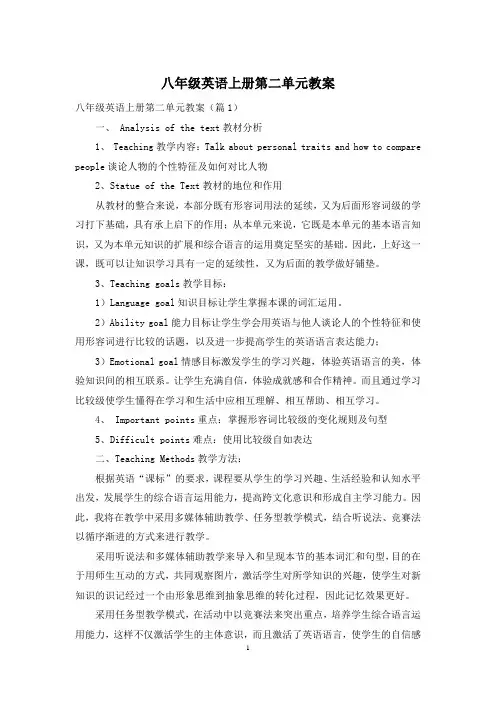
八年级英语上册第二单元教案八年级英语上册第二单元教案(篇1)一、 Analysis of the text教材分析1、 Teaching教学内容:Talk about personal traits and how to compare people谈论人物的个性特征及如何对比人物2、Statue of the Text教材的地位和作用从教材的整合来说,本部分既有形容词用法的延续,又为后面形容词级的学习打下基础,具有承上启下的作用;从本单元来说,它既是本单元的基本语言知识,又为本单元知识的扩展和综合语言的运用奠定坚实的基础。
因此,上好这一课,既可以让知识学习具有一定的延续性,又为后面的教学做好铺垫。
3、Teaching goals教学目标:1)Language goal知识目标让学生掌握本课的词汇运用。
2)Ability goal能力目标让学生学会用英语与他人谈论人的个性特征和使用形容词进行比较的话题,以及进一步提高学生的英语语言表达能力;3)Emotional goal情感目标激发学生的学习兴趣,体验英语语言的美,体验知识间的相互联系。
让学生充满自信,体验成就感和合作精神。
而且通过学习比较级使学生懂得在学习和生活中应相互理解、相互帮助、相互学习。
4、 Important points重点:掌握形容词比较级的变化规则及句型5、Difficult points难点:使用比较级自如表达二、Teaching Methods教学方法:根据英语“课标”的要求,课程要从学生的学习兴趣、生活经验和认知水平出发,发展学生的综合语言运用能力,提高跨文化意识和形成自主学习能力。
因此,我将在教学中采用多媒体辅助教学、任务型教学模式,结合听说法、竞赛法以循序渐进的方式来进行教学。
采用听说法和多媒体辅助教学来导入和呈现本节的基本词汇和句型,目的在于用师生互动的方式,共同观察图片,激活学生对所学知识的兴趣,使学生对新知识的识记经过一个由形象思维到抽象思维的转化过程,因此记忆效果更好。
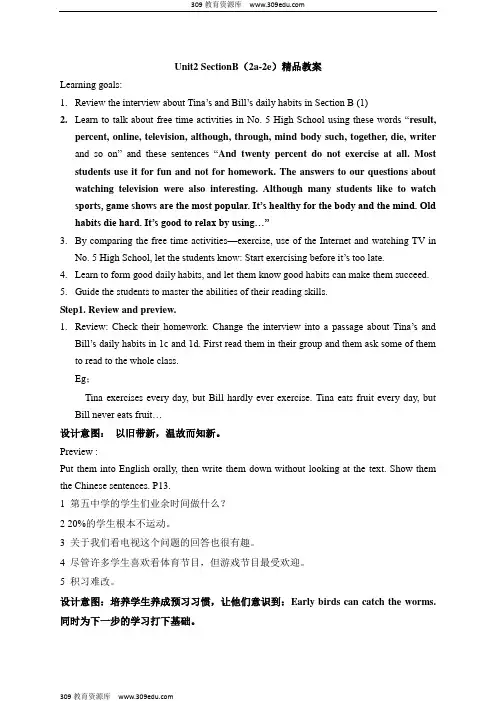
Unit2 SectionB(2a-2e)精品教案Learning goals:1.Review the interview about Tina’s and Bill’s daily habits in Section B (1)2.Learn to talk about free time activities in No. 5 High School using these words “result,percent, online, television, although, through, mind body such, together, die, writer and so on” and these sentences “And twenty percent do not exercise at all. Most students use it for fun and not for homework. The answers to our questions about watching television were also interesting. Although many students like to watch sports, game shows are the most popular. It’s healthy for the body and the mind. Old habits die hard. It’s good to relax by using…”3.By comparing the free time activities—exercise, use of the Internet and watching TV inNo. 5 High Schoo l, let the students know: Start exercising before it’s too late.4.Learn to form good daily habits, and let them know good habits can make them succeed.5.Guide the students to master the abilities of their reading skills.Step1. Review and preview.1.Review: C heck their homework. Change the interview into a passage about Tina’s andBill’s daily habits in 1c and 1d. First read them in their group and them ask some of them to read to the whole class.Eg;Tina exercises every day, but Bill hardly ever exercise. Tina eats fruit every day, but Bill never eats fruit…设计意图:以旧带新,温故而知新。
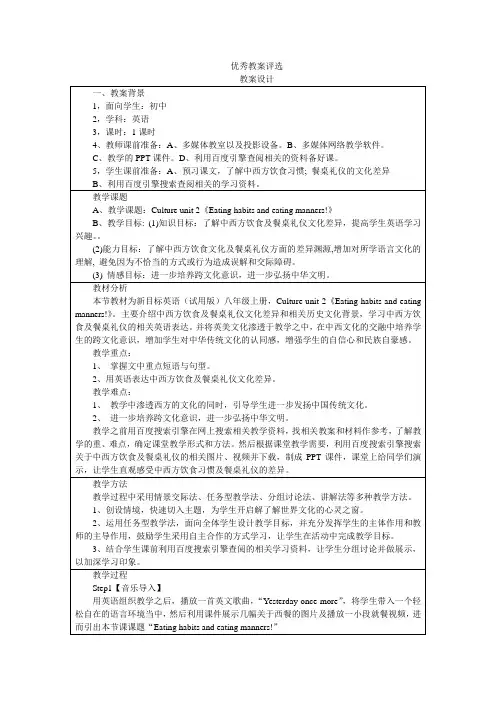
优秀教案评选【板书】Eating habits and eating manners!【百度文库】/search?word=%D3%A2%C3%C0%C8%CB%D3%C3%B2%CD%C 6%F7%BE%DF%CD%BC%C6%AC&lm=0&od=0【百度搜索】/s?bs=%CE%F7%B2%CD%CD%BC%C6%AC&f=8&wd=%C8%C8%B9 %B7%CD%BC%C6%AC【百度视频】/v?ct=301989888&rn=20&pn=0&db=0&s=19&rsp=8&word=%D3% C3%B2%CD%C0%F1%D2%C7%CA%D3%C6%B5&fbl=1024Step2【讲授新课】1、西餐简介2、中西方饮食习惯3、餐桌礼仪【百度搜索】西餐简介/s?wd=%CE%F7%B2%CD%BC%F2%BD%E9【百度搜索】中西方饮食习惯/s?wd=%D6%D0%CE%F7%B7%BD%D2%FB%CA%B3%CF%B0% B9%DF【百度搜索】餐桌礼仪/s?wd=%B2%CD%D7%C0%C0%F1%D2%C7Step3【师生活动】【学生活动】学生根据教师要求,领受教学任务。
阅读课文在合作中完成既定目标。
【教师活动】教师时刻关注学生的活动状态,师生共同解决可能存在的问题和困惑,教师还可以补充以下问题(课件展示):How many western eating habits do you know?Do you like western fast food?Can you tell me some Chinese fast food?上述四个问题使学生更好的了解课文内容,并利用所学的知识和信息来进行自主对话,这样既锻炼了口语又巩固了课文内容。
【板书】fast food(KFC) eating habitsStep4【文章讲解】1.KFC相关知识。
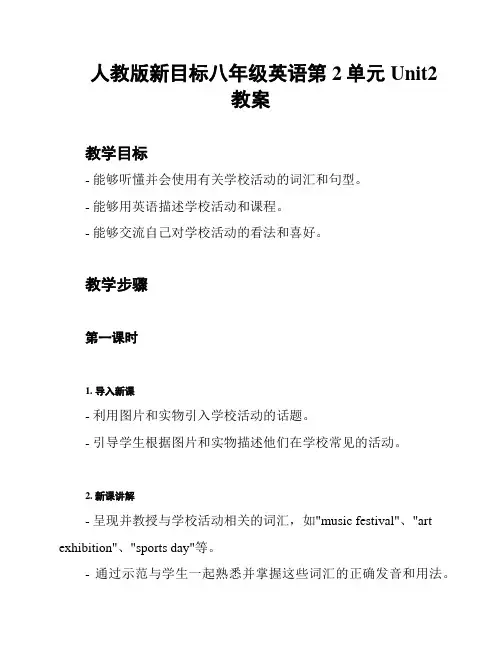
人教版新目标八年级英语第2单元Unit2教案教学目标- 能够听懂并会使用有关学校活动的词汇和句型。
- 能够用英语描述学校活动和课程。
- 能够交流自己对学校活动的看法和喜好。
教学步骤第一课时1. 导入新课- 利用图片和实物引入学校活动的话题。
- 引导学生根据图片和实物描述他们在学校常见的活动。
2. 新课讲解- 呈现并教授与学校活动相关的词汇,如"music festival"、"art exhibition"、"sports day"等。
- 通过示范与学生一起熟悉并掌握这些词汇的正确发音和用法。
- 操练这些词汇,并与学生一起编制句子来描述学校活动。
3. 听力训练- 播放关于学校活动的对话,要求学生仔细听并选择正确的图片。
- 学生互相对话,讨论听到的对话内容。
4. 对话练- 分组或两人一组,让学生模仿对话,表演关于学校活动的场景。
- 鼓励学生用英语进行自由对话,并互相分享自己参与过的学校活动。
5. 作业布置- 课堂分发作业卷,要求学生写一篇短文,介绍自己最喜欢的学校活动,并陈述原因。
第二课时1. 短文分享- 学生轮流与同桌分享自己写的短文。
- 鼓励其他学生提出问题或表达对短文的意见和建议。
2. 阅读训练- 学生阅读一篇关于学校活动的短文,并回答相关问题。
- 教师引导学生理解短文的内容,帮助他们解决阅读中遇到的问题。
3. 语法讲解- 教授句子结构"What do you think of + 学校活动?"和相应的答语。
- 帮助学生理解并掌握这种句子结构的用法。
4. 语法练- 学生分组或两人一组,互相提问"What do you think of + 学校活动?"并回答对方。
- 引导学生用所学词汇和句型互相交流和讨论自己对学校活动的看法和喜好。
5. 总结课堂内容- 教师带领学生回顾本节课所学的词汇、句型和语法。
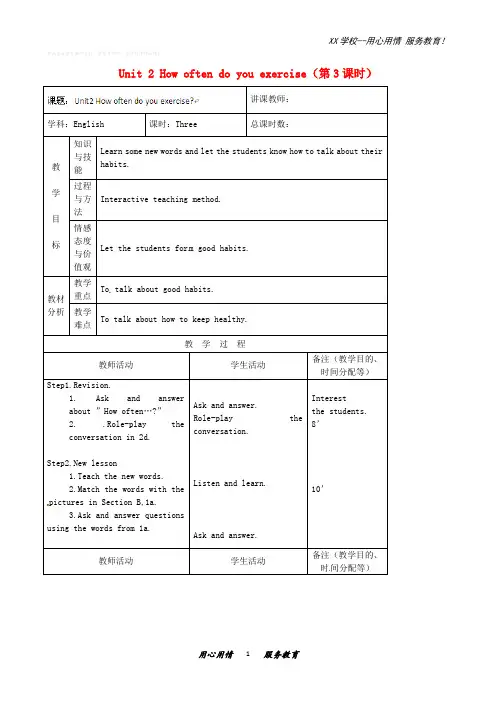
精品基础教育教学资料,请参考使用,祝你取得好成绩!Unit 2 How often do you exercise(第3课时)讲课教师:学科:English 课时:Three 总课时数:教学目标知识与技能Learn some new words and let the students know how to talk about their habits.过程与方法Interactive teaching method.情感态度与价值观Let the students for m good habits.教材分析教学重点To talk about good habits.教学难点To talk about how to keep healthy.教学过程教师活动学生活动备注(教学目的、时间分配等)Step1.Revision.1. Ask and answerabout ”How often…?”2. .Role-play theconversation in 2d.Step2.New lesson1.Teach the new words.2.Match the words with the pictures in Section B,1a.3.Ask and answer questions using the words from 1a. Ask and answer.Role-play theconversation.Listen and learn.Ask and answer.Interestthe students.8’10’教师活动学生活动备注(教学目的、时间分配等)Step3.Lis tening1.Listen to a interview andcircle the answers.2.Listen again and fill inthe blanks.3.Practice the conversation.Step4.Make a survey.Let students work in groups, Then rep ort their survey tothe teacher.Step5.ExercisesDo some exercises.Step6.SummarySum up the main knowledge in this cl ass.Step7.Homework1.Go over the new words.2.Do the exercise book. Listen and finish the exercises.Pra ctic e in pai rs.Work in groups.Write the answers down.Try to say out the main knowledge.8’6’5’6’2’板书Unit2 How often do you exercise?1.junk food2.drink coffee3.be good for healt h4.eat a healthy breakfast5.eat healthily教学后记:。
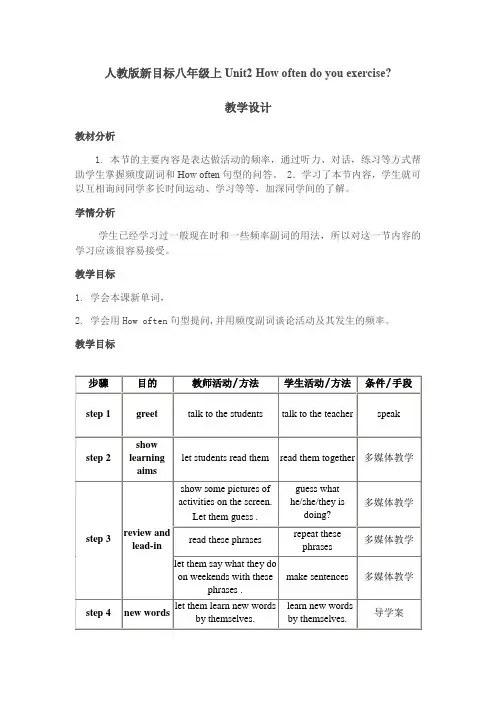
人教版新目标八年级上Unit2 How often do you exercise?
教学设计
教材分析
1. 本节的主要内容是表达做活动的频率,通过听力、对话,练习等方式帮助学生掌握频度副词和How often句型的问答。
2.学习了本节内容,学生就可以互相询问同学多长时间运动、学习等等,加深同学间的了解。
学情分析
学生已经学习过一般现在时和一些频率副词的用法,所以对这一节内容的学习应该很容易接受。
教学目标
1. 学会本课新单词,
2. 学会用How often句型提问,并用频度副词谈论活动及其发生的频率。
教学目标。
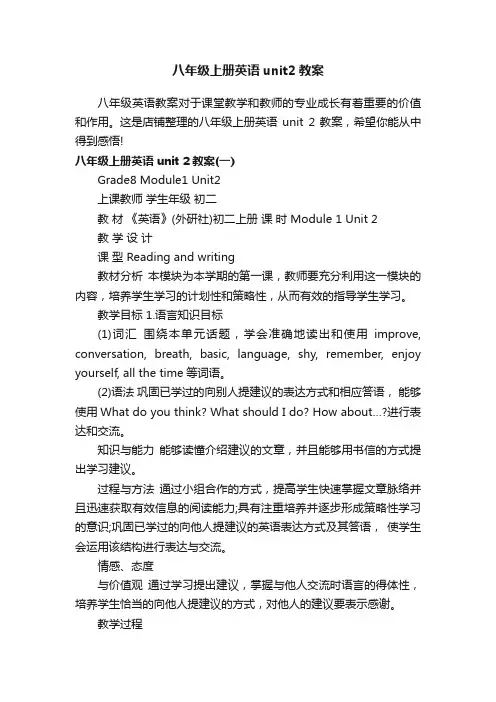
八年级上册英语unit2教案八年级英语教案对于课堂教学和教师的专业成长有着重要的价值和作用。
这是店铺整理的八年级上册英语unit 2教案,希望你能从中得到感悟!八年级上册英语unit 2教案(一)Grade8 Module1 Unit2上课教师学生年级初二教材《英语》(外研社)初二上册课时 Module 1 Unit 2教学设计课型 Reading and writing教材分析本模块为本学期的第一课,教师要充分利用这一模块的内容,培养学生学习的计划性和策略性,从而有效的指导学生学习。
教学目标 1.语言知识目标(1)词汇围绕本单元话题,学会准确地读出和使用improve, conversation, breath, basic, language, shy, remember, enjoy yourself, all the time等词语。
(2)语法巩固已学过的向别人提建议的表达方式和相应答语,能够使用What do you think? What should I do? How about…?进行表达和交流。
知识与能力能够读懂介绍建议的文章,并且能够用书信的方式提出学习建议。
过程与方法通过小组合作的方式,提高学生快速掌握文章脉络并且迅速获取有效信息的阅读能力;具有注重培养并逐步形成策略性学习的意识;巩固已学过的向他人提建议的英语表达方式及其答语,使学生会运用该结构进行表达与交流。
情感、态度与价值观通过学习提出建议,掌握与他人交流时语言的得体性,培养学生恰当的向他人提建议的方式,对他人的建议要表示感谢。
教学过程八年级上册英语unit 2教案(二)教学步骤活动目的教师活动学生活动1. Warming up andLead in 本活动的目的在于激活话题,为课文阅读提供引子,导入课文,通过题目谈论并预测文章内容。
激发学生学习兴趣,调动学习积极性。
T: What’s your favourite subject at school?Do you think English difficult?T: Show the title, and ask : What’s your problem about learning English? The students work in pairs and think about some questions they would like to ask .2. pre-reading 锻炼学生听力,并以此让学生能够初步了解文章大概内容,进一步熟悉本单元话题。
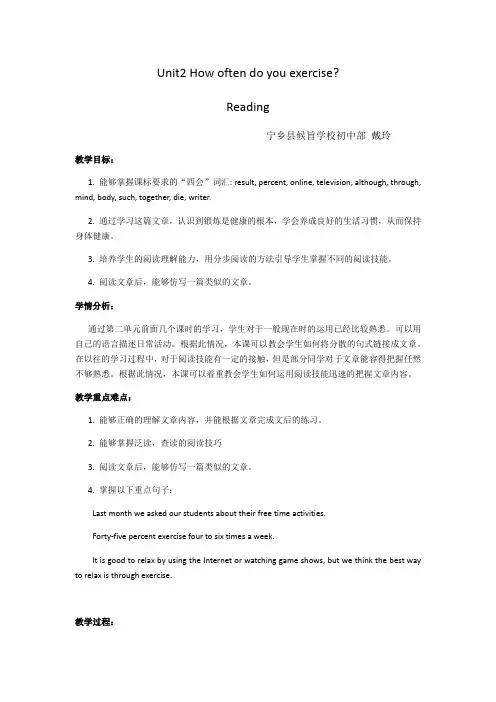
Unit2 How often do you exercise?Reading宁乡县候旨学校初中部戴玲教学目标:1. 能够掌握课标要求的“四会”词汇: result, percent, online, television, although, through, mind, body, such, together, die, writer.2. 通过学习这篇文章,认识到锻炼是健康的根本,学会养成良好的生活习惯,从而保持身体健康。
3. 培养学生的阅读理解能力,用分步阅读的方法引导学生掌握不同的阅读技能。
4. 阅读文章后,能够仿写一篇类似的文章。
学情分析:通过第二单元前面几个课时的学习,学生对于一般现在时的运用已经比较熟悉。
可以用自己的语言描述日常活动。
根据此情况,本课可以教会学生如何将分散的句式链接成文章。
在以往的学习过程中,对于阅读技能有一定的接触,但是部分同学对于文章能容得把握任然不够熟悉。
根据此情况,本课可以着重教会学生如何运用阅读技能迅速的把握文章内容。
教学重点难点:1. 能够正确的理解文章内容,并能根据文章完成文后的练习。
2. 能够掌握泛读,查读的阅读技巧3. 阅读文章后,能够仿写一篇类似的文章。
4. 掌握以下重点句子:Last month we asked our students about their free time activities.Forty-five percent exercise four to six times a week.It is good to relax by using the Internet or watching game shows, but we think the best way to relax is through exercise.教学过程:Part I 自能预习1.Vocabulary learning根据句意及首字母提示填写单词。
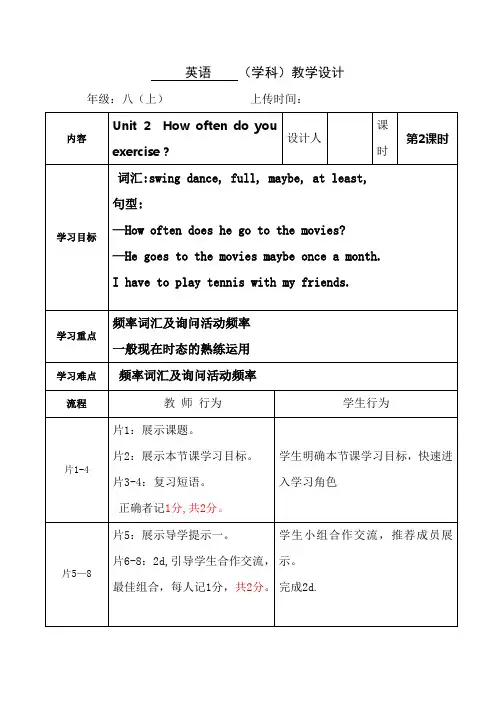
英语(学科)教学设计年级:八(上)上传时间:内容Unit 2 How often do youexercise?设计人课时第2课时学习目标词汇:swing dance, full, maybe, at least, 句型:—How often does he go to the movies?—He goes to the movies maybe once a month.I have to play tennis with my friends.学习重点频率词汇及询问活动频率一般现在时态的熟练运用学习难点频率词汇及询问活动频率流程教师行为学生行为片1-4 片1:展示课题。
片2:展示本节课学习目标。
片3-4:复习短语。
正确者记1分,共2分。
学生明确本节课学习目标,快速进入学习角色片5—8 片5:展示导学提示一。
片6-8:2d,引导学生合作交流,最佳组合,每人记1分,共2分。
学生小组合作交流,推荐成员展示。
完成2d.片9-18 片9:展示导学提示二。
片10-13:引导学生自主学习语法,引导学生抢答对一题记1分,共4分。
片14-17:引导学生完成3a,3b。
片18:评出本节课最佳小组及个人,表现最佳的小组记5分。
学生合作探究,并看语法做笔记,向老师提出本节课的疑点,当堂练习,完成3a, 3b,自主检测。
板书设计Unit 2 How often do you exercise?swing dance, full, maybe, at least,—How often does he go to the movies?—He goes to the movies maybe once a month.I have to play tennis with my friends.教学反思。
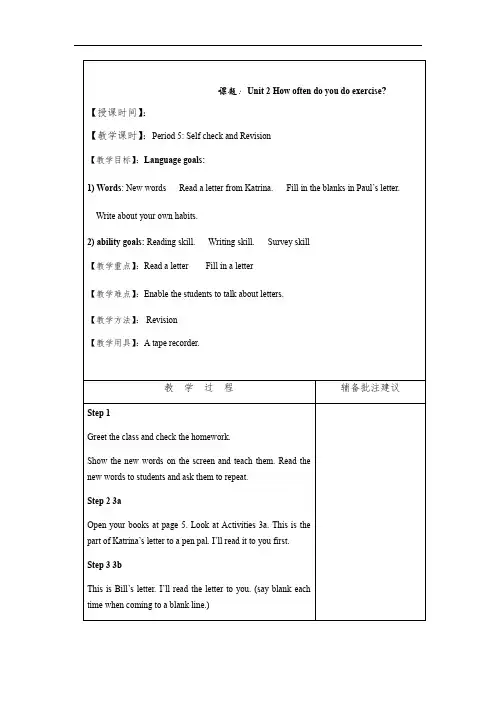
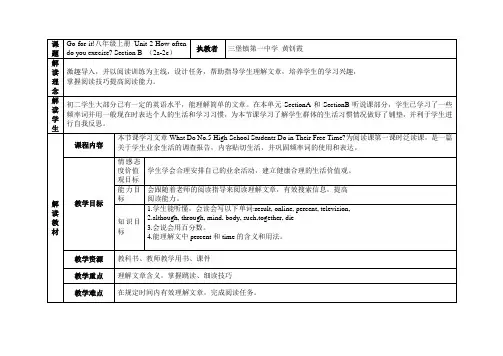
1 / 3
Unit 2 How often do you exercise?Section A
一、教学目标:
1.语言知识目标:
1)能掌握以下单词:
housework, hardly, ever, hardly ever, once, twice, Internet。
能掌握以下句型:
①—What do you do on weekends?—I usually exercise.
②—What does he do on weekends?—He usually watches TV.③—How often
do you watch TV?
④—How often does he watch TV?
2)能了解以下语法:
频度副词及一般现在时简单谈论周末活动情况。
2.情感态度价值观目标:
通过本单元的学习,养成健康的饮食习惯,保证充足的睡眠时间,进行合
理的运动锻炼,以保持健康的体魄。培养学生的逻辑表述能力,激发学生的积
极思维,并使学生互相了解,增进友谊,加强人际交往,以形成良好的人际关
系。
二、教学重难点
1.教学重点:
1)对6个频度副词细微差异的理解及使用。
2)弄清一般现在时在不同人称下动词形式及提问的变化。
2 / 3
2.教学难点:—I watch TV twice a week.—He watches TV twice a week.1)第三
人称单数谓语动词在此核心句型中的运用。
2)谈论课余时间的各项活动,以及初步认识和使用频率副词。
三、教学过程
Ⅰ. Lead in
Talk about the weather and your weekend’s activities.
Ⅱ. Presentation
(1) T asks:“Whatis the weather like today?” (show the question on white
board)Ask Ss to answer :It’s……today.
(2) Then,T says:,“So, we can’t exercise on rainy day, but maybe we can
exercise onweekends. What do you usually do on weekends?”
Ask Ss to answer, then show the words:housework……ask Ss to answer
(accordingto the pictures)
(3)Show the frequency words.
always (100%)usually(80%)often (30-50%)
sometimes (20%)hardly ever(5%)never (0%)
ask Ss to read and learn them, show the sentences about these words.
Ⅲ. Writing
1.Lookatthepicture.Discusswithyourpartners.Makealistoftheweekendactivities.
2. Let some Ss read out their activities. Let other Ss add more activities.Ⅳ.
Listening
1. Let a student read the words aloud. Make sure all the Ss know the meaning of
thewords.
3 / 3
2. Tell Ss to listen and write the letters from the picture above on the line below.
3. Play the tape for the first time. Ss listen and fill in the blanks.
4. Play the tape for the second time for the Ss to check the answers.
Ⅴ. Pair work
1. Act out the conversation with a student.
2. Let Ss talk about the pictures in 1a in pairs.
3. Let some Ss act out their conversations.
Ⅵ. Group work
1. Let Ss read the words in 1a.
2. Let Ss make new conversations, then work with groups, ask and answer
questions.
3. Ask one or two students to work with T, ask and answer questions.
4. Act out the conversations without books.
Ⅷ. Practice
1. Show the questions about do or does.
2. Ask Ss to fill in the blanks.
3. Ask Ss to answer, then check and read.
Homework:
1. Practice the conversation in SecA-1c
2. Make your own conversations and write them down.